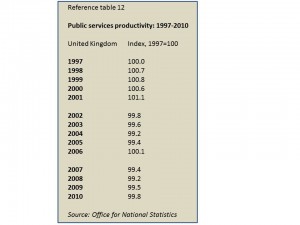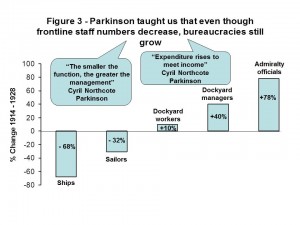(I’ve just come across something so unbelievable, that I’m delaying releasing the list of Britain’s “best value” bosses till tomorrow)
As the arguments rage on about the need for austerity versus cutting too far and too fast, there is a wonderful report from the Office for National Statistics which no politicians dare mention. This report reveals that productivity in the public sector has “increased” by a staggering 0.0% a year since 1997. In fact, it’s actually gone down by 0.02% in the 13 years�from 1997�to 2010.
This is so incredible, that I have to quote the absolutely priceless conclusion of the ONS report:
“Productivity for public services has remained broadly constant between 1997 and 2010, with an annual average growth rate of 0.0%.� Both public service output (activities performed and services delivered) and public service inputs (labour, goods and services and capital), grew by 3.0% per year on average”.
This is truly astonishing, truly amazing. Any organisation can improve productivity. A serious productivity improvement programme would target something like 20% in 12 to 18 months. A more relaxed approach would be 10%. A totally easy productivity programme might aim at 5% a year. An utterly pathetic attempt to improve productivity could be 2% to 3% a year. So, what has the British public sector achieved? Yes, it’s 0.0%! Nothing. Nada. Niente. Zero. Niechevo. Nul points.
Here are the ghastly figures: (click on diagrams to see them more clearly)
In the period 1997-2010, the number of managers in most areas of the public sector has doubled. (The NHS, for example, has gone from over 8 beds per manager in 1997 to around 3.7 beds per manager today) In the period 1997-2010, the average salary of public-sector managers has doubled and the average salary of public-sector-executives has shot up by around a factor of around four from about �70,000 to well over �250,000. And what have all these increasingly highly paid managers and executives achieved? OK, you guessed it – nothing.
So, what does this show? It shows that we should be slashing the number of managers in the public sector by at least 30% (getting rid of the worst) and that we should be demanding that the remaining managers and executives pull their finger out and else they get fired. No, not early retirement with �500,000+ pay-offs, but fired with nothing.
But sadly, what is actually happening in the public sector, is that most executives and managers are keeping their jobs and�still getting salary increases, while reducing the number of useful frontline workers. This precisely reflects what management expert Cecil Northcote Parkinson (of Parkinson’s Law) observed when the navy downsized after the first world war -�bureaucracies always grow by 5% to 7% a year, even when the number of frontline staff decreases;
(Source of public-sector productivity data http://www.ons.gov.uk/ons/rel/psa/public-sector-productivity-estimates–total-public-sector/2010/index.html�)















